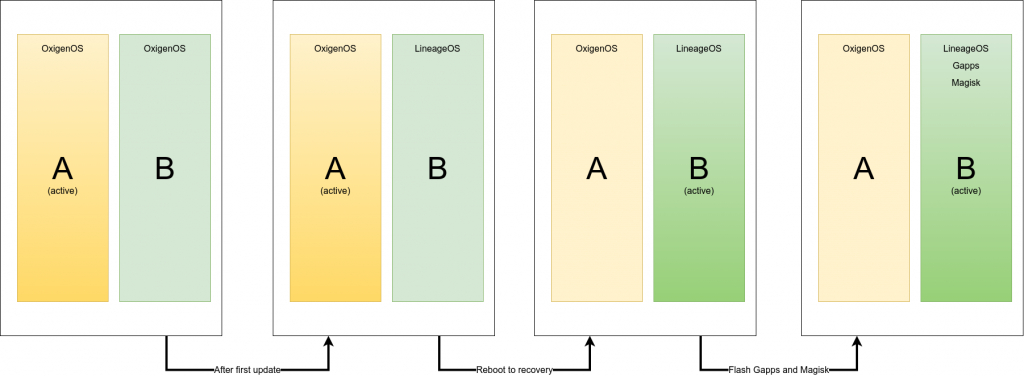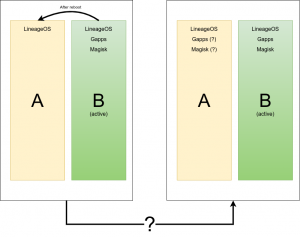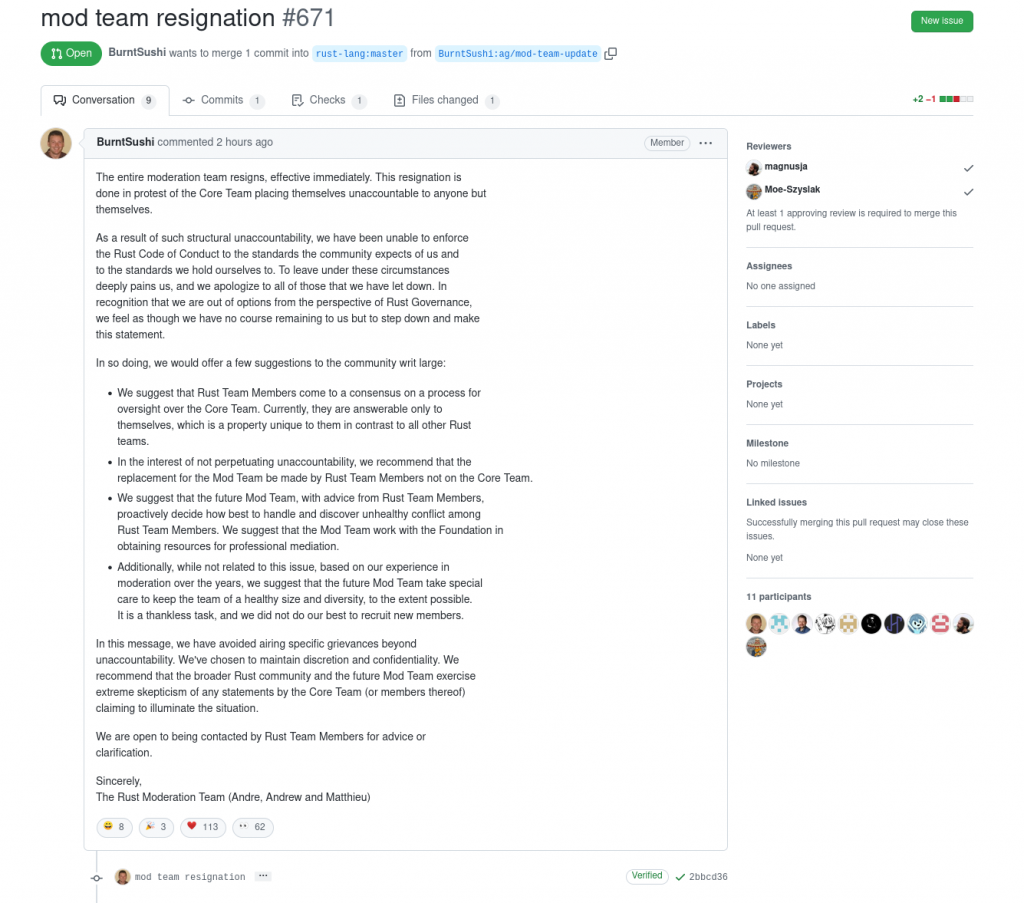Disclaimer
While the premise of this post might seem a bit cringe, in that is fundamentally a missed conversation with someone I have no way to talk to (and I don’t picture myself as some sort of stan of him), I think it is a good starting point for a broader reflection on some of the themes I care most.
On Signal, leftist service providers and the relation between individual and society
I am deeply fascinated by the figure of Moxie Marlinspike. He is a world renowned cryptographer, the creator of SSLstrip, and the creator and maintainer of Signal, both the apps and the backend services.
While he gained attention and respect in the crypto((as in cryptography, not cryptocurrency…)) community for the former (and for the technical novelties introduced with the latter), he is mainly known to the wider audience because of the credibility gained during the years of operation of Signal: a service designed and operated –for free– to protect as much as possible its users from mass surveillance.
He is also a fierce critic of the idea of decentralization((He motivates his position in this talk, and reiterates it in this blog post))((https://en.wikipedia.org/wiki/Decentralization – This is quite certainly not the case with today’s internet, as the majority of us participate in a rather asymmetrical way to the extent of the net.)). This is somehow remarkable because of the environment from which he comes from, where decentralization is often held as a value and a milestone in the path to the emancipation of the people through means of technology((I am being ironic…)).
So, why am I talking about him? It’s because I often agree with his analyses, I feel like we share some common ground on many political beliefs, but then I crumble to the ground with many of the choices I see him doing through means of his Signal project.
The Leftist anarchist squatter
I always first picture him as a comrade –as I am–, a leftist anarchist who is fighting for a better world for himself and everyone. Also, he manifested positions that resonate with me many times((https://moxie.org/2013/01/07/career-advice.html))((https://moxie.org/stories/together-two/))((https://moxie.org/stories/promise-defeat/)), and I assume is inspired by a honest pursuit of emancipation of the people from the oppression of capitalism. For example he asks himself((https://moxie.org/stories/together-one/)):
This cycle seems to be a common thread for those of us who aren’t interested in living life for money, property, or prestige. But if we realize that happiness must be an active experience, what good is dedicating ourselves to transformation if it means falling victim to the banality of routine which we so despise in the capitalist abstraction of every day life?
and also((again https://moxie.org/stories/promise-defeat/))
But in a way I was prepared for it. Just like with the task of destroying capitalism, there were dizzying odds against me that I couldn’t ignore.
In his many recounts of previous lives, he often narrates of his experiences living in squats or communal housing projects. He alludes to the world collective and as he has been part of some((https://moxie.org/stories/pink-stool/))((https://moxie.org/stories/together-two/)):
I’d been living in a 8-bedroom, three story, Pittsburgh PA collective house.
Eventually he also decided that he’d take me all the way to San Francisco, so we talked for hours on the road and he’d ask me great questions like “Wait, now what’s a ‘collective’?”
So, all the elements here point me to deduce that he is one of us, him I could easily mistake for one of the many people I encountered at a meeting in a squat, hazy with weed smoke and full of rage against the way the world revolves. Sure, one of the most adventurous, but still one I could discuss with frankly of my perspectives, not speaking in half voice of how I despise the world I am somehow contributing to.
But something in his character, at least the character that transpires from what is publicly known, is odd.
The CEO
Although playing the role of a misfit in his posts, the public record of his works shows a different pattern: he has been a greatly successful professional. Assuming the Career section on his Wikipedia page is correct, he has been a software engineer, he has been a very successful security researcher and also head of cybersecurity at Twitter. He also founded and led companies instrumental to the success of Signal as a widely adopted service.
He apparently thrived in the venture capital world, interacting with many of the elites in the big tech. His declared objective was to spread the use of his new secure instant messaging protocol (the signal protocol), but I still can’t understand how he could have been comfortable in cooperating with something I see as one of the instrument of capitalism in oppressing us.
What is even more strange is the language he uses while talking of Signal. He uses a jargon that is indistinguishable from that of those very same companies.
I want to point out at this point that I am not judging him, nor I condemn his actions. I may easily imagine him doing all this in the spirit of sacrificing to reach a better outcome for the majority of us. The political opportunity of these choices is what I will comment later on in this text.
The duck test
If it looks like a duck, swims like a duck, and quacks like a duck, then it probably is a duck.
I see the above adage as a summary of the reductionist approach: a layman’s version of the Occam’s razor. While I do embrace it fully when trying to analyze the physical world, I have to admit it could miss the point when used to test the nature of human and social interactions.
I am part of some tech collectives and I see that all of us have to accept some degree of compromise with the world we criticize. Often –and this is also my case– we live off the salary of these same tech companies we have issues with. In many cases, we cannot easily escape market mechanisms, also if we fiercely criticize them. The rules of the game are not up to us to decide, we can yell and cry but, at some point, we have to decide how to play by them.
The confusion here may arise from the fact that Moxie at some point choose((or he did not, and found himself in this situation, nevertheless.)) to conflate his public action with his work. This has often the potential to generate friction with those who observe or rely on your work. In many cases to avoid friction one tries to lower their public profile, in order not to attract to many lightnings.
But there is some use in the duck test also with the sweet and sour human hussle: at some point we have to make choices and answer for them to the people around us.
The broader picture
I am convinced that an individual is not capable of altering the course of history. That is, one can be instrumental in a process that is much bigger, and foster change in a direction that is already determined by the historical forces. With this I do not mean that there is no free will, just that one may not be held responsible for a big change, for good or bad.
So, Moxie is not the responsible for the way the means of communication are changing now. He is merely instrumental –as I am in my small area of action– to a process that is the consequence of the new technical possibilities we have now and an old desire of being in touch with the people around us((and the social and political conditions in the world we live in.)).
These changes are radical and imply((I do not mean a causal relation here, rather a deep correlation.)):
- the possession of a smartphone
- the switch from an asynchronous form of communication (the email) to a synchronous one (the instant messaging) as primary medium
- to delegate heavily our means of communication to a relatively small number of entities
These seems like trivial facts where I live, and are such natural at this time that is difficult for me to remember how different it was to communicate just 15 years ago. But all these facts bear unavoidable consequences.
Having (and being expected to) a smartphone with oneself all the time in all the places is a liability, not just for the conspirator who is hiding from the state, but also for the ordinary person that has less means to escape the rule of law in case of need.
The use of mainly synchronous communication services is taking a toll on our ability to observe the world, as we are more and more drawn to the realm of the vertical-aspect-ratio-window-on-the-web.
The last point is the one I see as more problematic in the long term. Surely the email stack (the protocols, the softwares and the sociology) are problematic, and have had (and still will have) tons of issues, but it is still feasible for a small group of people to host a mailserver and interact with the rest of the world. In contrast, what I saw in many collectives and in the broader activists’ communities is a switch towards a limited set of communication providers((I name it here. For the email: google (gmail) and protonmail. For the instant messaging: whatsapp (and facebook at large), telegram (this increasingly predominant), signal. For the videochats: zoom, google (chat).)). While this might just be faced as the spirit of the time (the post has always been a single entity, why should I worry now for a few to handle my communications), I see it as a dangerous path.
Sure, Signal and the zealous evangelism of E2EE((end to end encryption: the possibility for two parties to communicate in a way that the service provider is not capable of eavesdrop.)) aim at stopping the global and indiscriminate surveillance, and has been pretty successful until now. This is due of course to the political cost of requiring to break E2EE for everyone, but the case has been made in many commonwealth countries and in the US and EU to require some sort of backdoor((https://www.nytimes.com/2019/11/19/technology/end-to-end-encryption.html))((https://www.rollingstone.com/culture/culture-news/revealed-uk-government-publicity-blitz-to-undermine-privacy-encryption-1285453/))((https://techcrunch.com/2016/08/24/encryption-under-fire-in-europe-as-france-and-germany-call-for-decrypt-law/)).
I do not see this as an easy struggle. Even more, I do not know if this is the struggle that is worth fighting now. This leads me to the next question.
Where is the value?
I wonder what is in the head (and in the heart) of Moxie, when he thinks of the people he developed Signal for. Reading his posts, I figured in my mind a sketch of the people and the contexts he frequented. I know US culture indirectly, so I do not pretend to really understand it. But I guess that one of the core values he looks for is that of community of peers, and I picture his actions as a way to give tools and offer protection to those communities he inhabited (and the many he only heard of).
In this picture I have of his thought, I feel that a very important aspect is emancipating those communities from the oppression of the state. Such oppression manifests in many ways, primarily through police direct intervention, then on the broader stage of mass surveillance.
I guess that here arises one of the main disconnect between us. I live in a place where the state is surely more intrusive, and yet less scary than the one I picture from his words and what I read every day. Sure, I do not want to have problems with the police and I see the state as functional to the workings of capitalism, but I don’t see (at least not anymore) the destruction of the state as a final goal in the path to emancipation. It is an obstacle, clearly, but it’s not the main enemy. The main enemy to me is embodied by the real power relationships between who has to work to live, and who profits from that work. The path towards the subversion of this system lies in empowering as much as possible the people around me, and removing power from those who retain it.
Oftentimes, this means that I have to renounce to power myself, and I am sure that Moxie is all too aware of these dynamics, that often arise in the collectives he frequented.
This also means that, sometimes, my authority is diminished, my capacity of taking free choices is reduced by virtue of this sharing power with those around me.
So centralizing is for sure faster and more effective in delivering a safe and modern service to the user base of Signal, but at the same time is a liability.
AS always, money
Another issue lies in the choice of deploying a way of exchanging money using Signal((https://signal.org/blog/help-us-test-payments-in-signal/))((https://signal.org/blog/update-on-beta-testing-payments/))((This has recently been a very contentious issue. As the public debate on cryptocurrencies rages, I will abstain on any analysis on these aspects.)). It doesn’t really matter that this is implemented through a blockchain, nor all the technical bits. Moreover, Moxie did not seem a fan of cryptocurrencies per se((https://twitter.com/moxie/status/1479482813237764097))
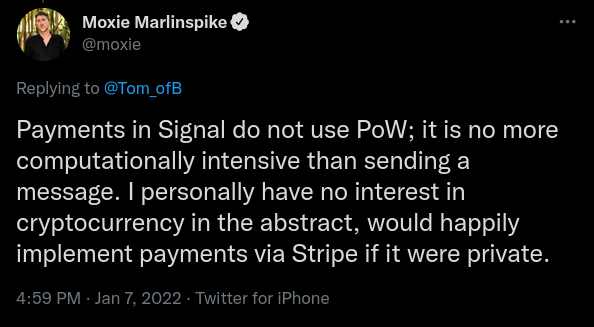
He seem more interested in offering a private payments system((I guess, a service with which to exchange money in a way that is not traceable.))
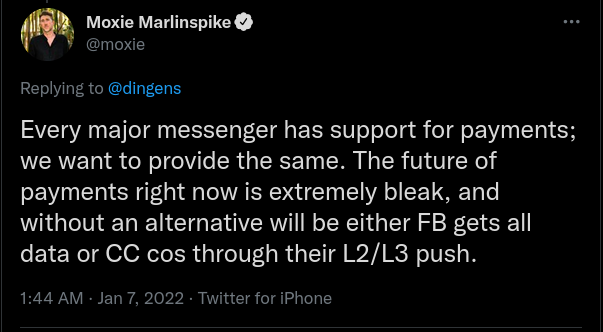
The issue here is that the service embraces the logic of value exchange not mediated by mutual trust relationships, but by a service.
Don’t mistake me for some sort of primitivist((although, I have to admit, it is a common attitude among the people I hang out with to despise money, or at the very least be very much cautious when it is involved in some relationship of sort.)), I am not proposing to renounce straight away to money. What I say is that this seems a very bitter pill to swallow. He seems to justify this as a matter of competition with other instant messaging providers. Many pointed out that this is something very off course for Signal, but all this seems not bound anymore to the concept of instant messaging. As he said, the ecosystem is moving.
Oddly enough, I have a story to tell that is related to (crypto)currencies and squats. Some time ago, in a squat I used to frequent, a pair of guys stopped by and begun to interact with the collective and the people of the squat about a cryptocurrency project they had assembled. They were proposing some sort of federated coin to be used inside the squat to compensate work (like the common chores or the shift at the bar service) and buy services (like a beer), and were touring Europe to promote it. Such coin then, upon approval of the local collective, could also be exchanged in other squats (just in a federated manner).
At first we took the idea seriously, but then let it down as we foresaw in it the same exploitation mechanism that we already lived in our lives.
Conclusions
I am still fascinated by Moxie. I find him even more fascinating because of all the contradictions he seems to embrace, and yet overcome in his unperturbed course of action.
What I choose to do with my time is quite different, but I still feel a sense of respect for him as a human who –I guess– cares for the people around him.
Meanwhile, the world around us is changing evermore abruptly and I hope to be able to keep the pace.
I don’t think that emails will go away very soon, and that we can rely on them once again. I also think that being able to change fast is not an absolute value, and that sometimes renouncing to some feature, is a quality of a software/service.


